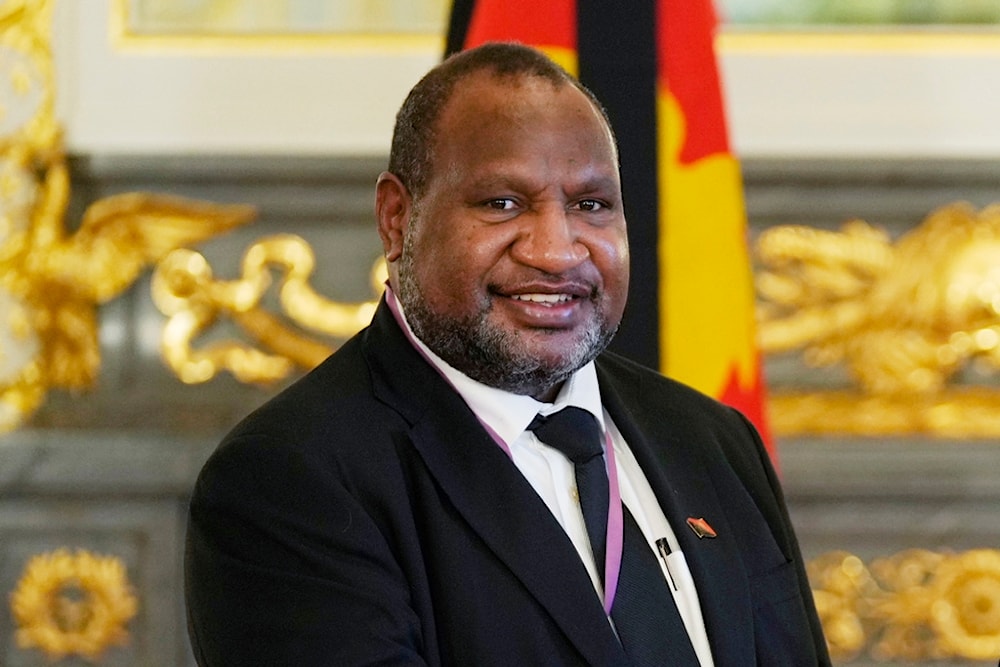PNG declares state of emergency following deadly riots over pay
Papua New Guinea police forces are patrolling Port Moresby after the country declared a state of emergency on Friday.
-

Papua New Guinean Prime Minister James Marape poses for a photo at Akasaka Palace State Guest House in Tokyo on Sept. 27, 2022. (AP)
Papua New Guinea police forces patrolled Port Moresby after the country declared a state of emergency on Friday, following violent riots that caused the deaths of at least 16 people.
With police authorities patrolling streets and places where crowds could gather, such as gas stations, the country has returned to a relatively calm ambiance. Matt Cannon, head of the local branch of a non-profit emergency responder service St John Ambulance, said, “We’re expecting the supermarkets that are functioning to reopen today and I’m hearing they have increased security to cater for potentially large numbers of people.”
Papua New Guinea burns over 'pay cut error'
On Wednesday, a police and public sector protest over pay cuts emerged but later developed into intense riots with cases of looting, burning buildings, and attempted break into the Prime Minister's office. Officials later declared the pay cuts an administrative miscalculation.
VIDEO: Buildings burn and looters target shops around Papua New Guinea's capital after a pay dispute involving the nation's security forces sparked angry protests.
— AFP News Agency (@AFP) January 11, 2024
Soldiers, police officers and prison staff staged a lively but peaceful protest in the morning of January 10,… pic.twitter.com/VkYU6eNwVI
Prime Minister James Marape then convoked a 14-day state of emergency across the country and suspended several governmental officials, including the finance secretary and police officers but affirmed that this does not indicate "their involvement in matters of concern."
Almost 1,000 police officers were summoned for backup patrolling and peacekeeping duties.
Following the events, Marape was encountered with heightened criticism and calls for his resignation. Former PM Peter O’Neill addressed what he considered Papua New Guinea's "darkest day" and referred to Marape saying, “There is no shame in taking responsibility, but it is absolutely shameful to continue knowing you have lost command and control."
During riots, seven people were killed in Lae, a northern county, and nine were killed in the capital. Police also revealed that over 50 people had been injured from gunshots and stabbings and were being treated at Port Moresby General Hospital.
Papua New Guinea requested assistance from Australia, whose Defense Minister, Richard Marles, said the country has gained back control with the help of police supervision.
Eddie Allo, an employee in the country, affirmed that everything is back to normal now, with police patrolling several areas in the capital. According to Allo, most vehicles on the road were government-owned as civilians had no access to fuel due to the closure of gas stations.
PNG tightens its security
In a different context, in May, Papua New Guinea Prime Minister, James Marape, announced that the country will sign a new security pact with the US, allowing its troops access to all the nation's ports and airports.
According to Marape, after securing parliamentary approval, the two countries will sign two agreements that will be focused on defense cooperation and maritime surveillance.
Marape argued, "We are elevating to a specific defense cooperation agreement, something that is falling short of a treaty," adding, "We are moving ahead, we are signing with the best military on the face of planet Earth."
The US, in the newly drafted agreements, will have unrestricted access to Papua New Guinea's water, thus securing vital movement in waters near sea routes to Australia and Japan. In return, Marape claimed Papua New Guinea would obtain access to US satellite surveillance.

 3 Min Read
3 Min Read








